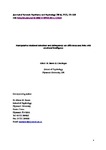Manipulative emotional behaviour and delinquency: sex differences and links to emotional intelligence.
| dc.contributor.author | Bacon, Alison | |
| dc.contributor.author | Regan, L | |
| dc.date.accessioned | 2016-06-30T12:28:22Z | |
| dc.date.available | 2016-06-30T12:28:22Z | |
| dc.date.issued | 2016-01-01 | |
| dc.identifier.issn | 1478-9949 | |
| dc.identifier.issn | 1478-9957 | |
| dc.identifier.uri | http://hdl.handle.net/10026.1/4998 | |
| dc.description.abstract |
Trait emotional intelligence (EI) encompasses high levels of emotional understanding and is generally associated with positive outcomes. However research has suggested that high EI might predispose some young females to delinquency. The present study investigated whether this relationship can be accounted for by a tendency towards emotionally manipulative behaviours, facilitated by high EI. Two hundred and fifty two young adults (125 female) completed measures of EI, Machiavellianism, managing the emotions of others (MEOS) and self-reported delinquent behaviour. High EI females presented higher levels of delinquency, Machiavellian Tactics and morality, the supposedly prosocial MEOS behaviours enhancing and diverting and the non-prosocial behaviours worsening, inauthenticity and concealing. High EI males reported fewer delinquent offences, high levels of MEOS prosocial enhancing behaviour and low levels of non-prosocial behaviours. We suggest that high EI may enable manipulative relational behaviours in some females which in turn support delinquency aimed at fulfilment of social or material goals. | |
| dc.format.extent | 331-348 | |
| dc.language | en | |
| dc.language.iso | en | |
| dc.publisher | Informa UK Limited | |
| dc.subject | emotional intelligence | |
| dc.subject | ; delinquency; | |
| dc.subject | relational aggression; | |
| dc.subject | sex differences | |
| dc.title | Manipulative emotional behaviour and delinquency: sex differences and links to emotional intelligence. | |
| dc.type | journal-article | |
| dc.type | Article | |
| plymouth.author-url | https://www.webofscience.com/api/gateway?GWVersion=2&SrcApp=PARTNER_APP&SrcAuth=LinksAMR&KeyUT=WOS:000375878700002&DestLinkType=FullRecord&DestApp=ALL_WOS&UsrCustomerID=11bb513d99f797142bcfeffcc58ea008 | |
| plymouth.issue | 3 | |
| plymouth.volume | 27 | |
| plymouth.publication-status | Published | |
| plymouth.journal | Journal of Forensic Psychiatry and Psychology (in press) | |
| dc.identifier.doi | 10.1080/14789949.2015.1134625 | |
| plymouth.organisational-group | /Plymouth | |
| plymouth.organisational-group | /Plymouth/Faculty of Health | |
| plymouth.organisational-group | /Plymouth/Faculty of Health/School of Psychology | |
| plymouth.organisational-group | /Plymouth/REF 2021 Researchers by UoA | |
| plymouth.organisational-group | /Plymouth/REF 2021 Researchers by UoA/UoA04 Psychology, Psychiatry and Neuroscience | |
| plymouth.organisational-group | /Plymouth/REF 2021 Researchers by UoA/UoA04 Psychology, Psychiatry and Neuroscience/UoA04 REF peer reviewers | |
| plymouth.organisational-group | /Plymouth/Research Groups | |
| plymouth.organisational-group | /Plymouth/Research Groups/Centre for Brain, Cognition and Behaviour (CBCB) | |
| plymouth.organisational-group | /Plymouth/Research Groups/Centre for Brain, Cognition and Behaviour (CBCB)/Behaviour | |
| plymouth.organisational-group | /Plymouth/Research Groups/Plymouth Institute of Health and Care Research (PIHR) | |
| plymouth.organisational-group | /Plymouth/Users by role | |
| plymouth.organisational-group | /Plymouth/Users by role/Academics | |
| dc.identifier.eissn | 1478-9957 | |
| dc.rights.embargoperiod | Not known | |
| rioxxterms.versionofrecord | 10.1080/14789949.2015.1134625 | |
| rioxxterms.licenseref.uri | http://www.rioxx.net/licenses/all-rights-reserved | |
| rioxxterms.type | Journal Article/Review |


